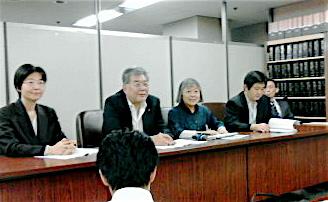
A storm of applause came from the public
that filled the court room when MINAMI Toshifumi, the chief justice of the
Tokyo High Court, finished reading a key conclusion and its reasons. The
decision was made on November 7, 2012 for KAWARAI Junko, a retired special
school teacher in response to the Supreme Court’s judgment to repeal her
one-month suspension and remand the case to the high court. The chief justice
recognized the fault of the Tokyo Metropolitan Board of Education, saying, “The
punishment of refusing to stand during the playing of the national anthem
negatively affects freedom of thought and conscience and is not supposed to be
done automatically or uniformly”. He also suggested, “At a special school,
personal contact between teachers and pupils or students is indispensable”. And
this is what Kawarai especially cherished. The chief justice ordered the
Tokyo Metropolitan Government to pay 300,000 yen as compensation for her
emotional distress caused by her suspension in addition to the payment of her
unpaid wages. This is the first case where damages are awarded in a lawsuit
over refusal to stand during the playing of “Kimigayo” national anthem. The
court decision that referred to freedom of thought and conscience and the influence
to education is remarkable. (SASAKI Yumi)
* Photo: Press conference after the
decision
都は30万円を支払え!
~河原井さん「君が代」損賠訴訟で勝訴
南敏文裁判長が主文・判決理由を読み終わると、満員の傍聴席から期せずして大きな拍手が起きた。今年1月最高裁で1ヶ月の停職処分が取り消され、東京高裁に
差し戻されていた河原井純子さん(写真・東京都立特別支援学校元教諭)の損害賠償請求裁判の判決が11月7日出た。南裁判長は、「不起立への処分は、思想・良心の自由に影響を与えるもので、機械的、一律的に行うべきではない」として都教委の過失を認めた。また、「養護学校では、
教諭と児童生徒の人格的触れ合いが教育活動には欠かすことができず」、河原井さんは特にこのことを重視していた。停職処分による精神的苦痛は、未払い給与の支払いだけではすまされないとして30万円の賠償を都に命じた。「君が代」裁判で損害賠償が認められたのは初めて。思想・良心の自由、また教育実践への影響に踏み込んだ判決は、
注目すべきだ。(佐々木有美)
No comments:
Post a Comment